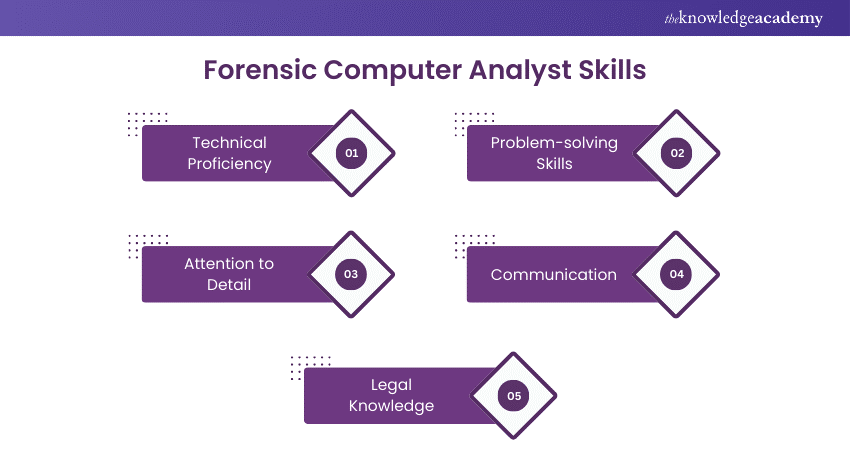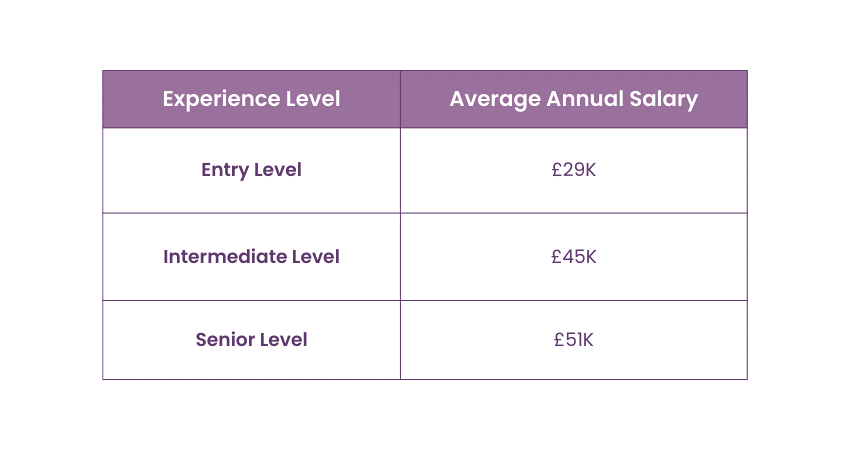We may not have the course you’re looking for. If you enquire or give us a call on + 1-866 272 8822 and speak to our training experts, we may still be able to help with your training requirements.
We ensure quality, budget-alignment, and timely delivery by our expert instructors.

Imagine being the Sherlock Holmes of the digital world, solving cyber mysteries and tracking down online offenders. That’s the exciting world of a Forensics Computer Analyst! These experts investigate cybercrimes by analysing digital evidence. If this idea sparks your curiosity, join us as we delve into this captivating career and discover the path to becoming the cyber sleuth you’ve always dreamed of. We’ll explore the skills you need and the steps to get started. Ready to uncover the secrets of the digital world? Let’s dive in!
Table of Contents
1) What is a Forensic Computer Analyst?
2) Forensic Computer Analyst Duties
3) Forensic Computer Analyst Skills
4) Forensic Computer Analyst Working Hours
5) Forensic Computer Analyst Salary
6) How to Become a Forensic Computer Analyst?
7) Conclusion
What is a Forensic Computer Analyst?
Forensic Computer Analyst are digital detectives responsible for investigating digital devices to unveil, gather, and protect important evidence. This position usually requires analysing computers, mobile phones, and networks to trace any unlawful activities, and recover hidden or deleted data.
Forensic Computer Analysts collaborate with law enforcement, corporations, and private security firms to discover concealed digital evidence and maintain the accuracy of information. The profession requires extreme dedication and adaptability as these experts often work for extended hours, particularly during active investigations.
Forensic Computer Analyst Duties
Forensic Computer Analysts perform a wide range of duties. Some of these duties include:
a) Collecting and preserving electronic evidence.
b) Analysing data from computers, networks, and mobile devices.
c) Recovering deleted or encrypted files.
d) Assisting in legal investigations by preparing reports and testifying in court.
e) Collaborating with law enforcement units and legal teams.
f) Ensuring that digital evidence remains secure and intact throughout the investigation process.
Forensic Computer Analyst Skills
Here are some of the skills required for this role:

1) Technical Proficiency: Mastering tools like EnCase, FTK, or X-Ways to extract and analyse data.
2) Problem-solving Skills: Thinking critically and synchronising fragmented data to solve complex cybercrimes.
3) Attention to Detail: Deeply looking for inconsistencies or anomalies in data to find out possible threats.
4) Communication: Strong written and verbal communication to explain technical findings in layman’s terms to non-technical stakeholders, including Law Enforcement.
5) Legal Knowledge: Thorough understanding of Cyber Laws, regulations, and chain-of-evidence protocols.
Stay one step ahead and build your defence with our Cyber Security Awareness Training. Join now!
Forensic Computer Analyst Working Hours
Experts work between 35 to 40 hours per week. However, flexibility is crucial, as the nature of investigations can lead to varying schedules. Some cases may demand extended hours beyond the usual workweek to ensure thorough analysis and timely results.
In some organisations, 24/7 coverage is required, with staff rotating on calls to ensure swift responses to Cyber Security incidents or criminal investigations. Hence, the working hours for this job profile cannot be precisely defined as they depend on the situation and intensity of the cases.
Forensic Computer Analyst Salary
Salaries are based on experience, location, and the sector they work in. Here is a breakdown of their average salary depending on experience level:

Source: Glassdoor
Salaries tend to be higher in private firms or high-demand industries like Finance and Healthcare, where data protection is a critical aspect of their operation.
How to Become a Forensic Computer Analyst?
Here are some of the aspects you need to fulfil to become a Forensic Computer Analyst:
Get Qualifications
Start with a degree in computer science, information security, or any related field. Many universities offer courses specifically focused on digital forensics and Cyber Security. Alongside your degree, consider earning industry certifications such as:
a) Certified Forensic Computer Examiner (CFCE) or
b) GIAC Certified Forensic Analyst (GCFA)
These certifications will help you to stand out in the job market.
Meet Job Requirements
Next, ensure you meet the standard job requirements, which includes:
1) Hands-on experience with digital forensic tools
2) Knowledge of relevant legal frameworks
3) The ability to handle sensitive data securely.
Experience through internships or entry-level Cyber Security roles can be crucial in meeting these demands.
Prepare a Cover Letter
Your cover letter must showcase your technical skills and zeal for Cyber Security while mentioning your relevant practical experience with digital forensics. Tailor your cover letter for each position, mentioning particular skills such as data recovery, encryption, and incident response.
Advance Career Education
Pursue further education such as a master’s degree in digital forensics or Cyber Security to advance your career as a Forensic Computer Analyst. Hands-on training through workshops and certifications will also help you be aware of the latest cyber threats and forensic technologies.
Learn to secure critical data with our Certified Cyber Security Professional (CCS-PRO) Course - Join today!
Conclusion
Forensic Computer Analysts play an important role in today’s digital landscape. These experts work tirelessly to safeguard our digital presence by fighting Cybercrime using cutting-edge technology to uncover the digital evidence that can solve complicated cases. You can flourish in this exciting and ever-evolving field by mastering the necessary skills and staying up to date with the latest Cyber Threats and Forensic Technologies.
Master the art of mitigating cyber threats with our Cyber Security Risk Management Course - Join today!
Frequently Asked Questions

Experts use tools like EnCase, FTK, and X-Ways to recover and analyse data. These tools help them in recovering deleted files, decrypt data, and ensure the evidence is preserved and admissible in court.

The bachelor degree takes an average of 3- 4 years to complete while certification and work experience may take extra time. Achieving full professional status as a Forensic Computer Analyst may take 5-6 years of education and training.

The Knowledge Academy takes global learning to new heights, offering over 30,000 online courses across 490+ locations in 220 countries. This expansive reach ensures accessibility and convenience for learners worldwide.
Alongside our diverse Online Course Catalogue, encompassing 19 major categories, we go the extra mile by providing a plethora of free educational Online Resources like News updates, Blogs, videos, webinars, and interview questions. Tailoring learning experiences further, professionals can maximise value with customisable Course Bundles of TKA.

The Knowledge Academy’s Knowledge Pass, a prepaid voucher, adds another layer of flexibility, allowing course bookings over a 12-month period. Join us on a journey where education knows no bounds.

The Knowledge Academy offers various Cyber Security Training, including the Computer Forensics Foundation Training, Social Engineering Training and Cyber Security Awareness Course. These courses cater to different skill levels, providing comprehensive insights into Types of Computer Viruses.
Our IT Security & Data Protection Blogs cover a range of topics related to Cyber Security, offering valuable resources, best practices, and industry insights. Whether you are a beginner or looking to advance your Cyber Security Skills, The Knowledge Academy's diverse courses and informative blogs have got you covered.
Upcoming IT Security & Data Protection Resources Batches & Dates
Date
 Computer Forensics Foundation Training
Computer Forensics Foundation Training
Thu 16th Jan 2025
Thu 6th Mar 2025
Thu 22nd May 2025
Thu 24th Jul 2025
Thu 25th Sep 2025
Thu 11th Dec 2025







 Top Rated Course
Top Rated Course



 If you wish to make any changes to your course, please
If you wish to make any changes to your course, please


